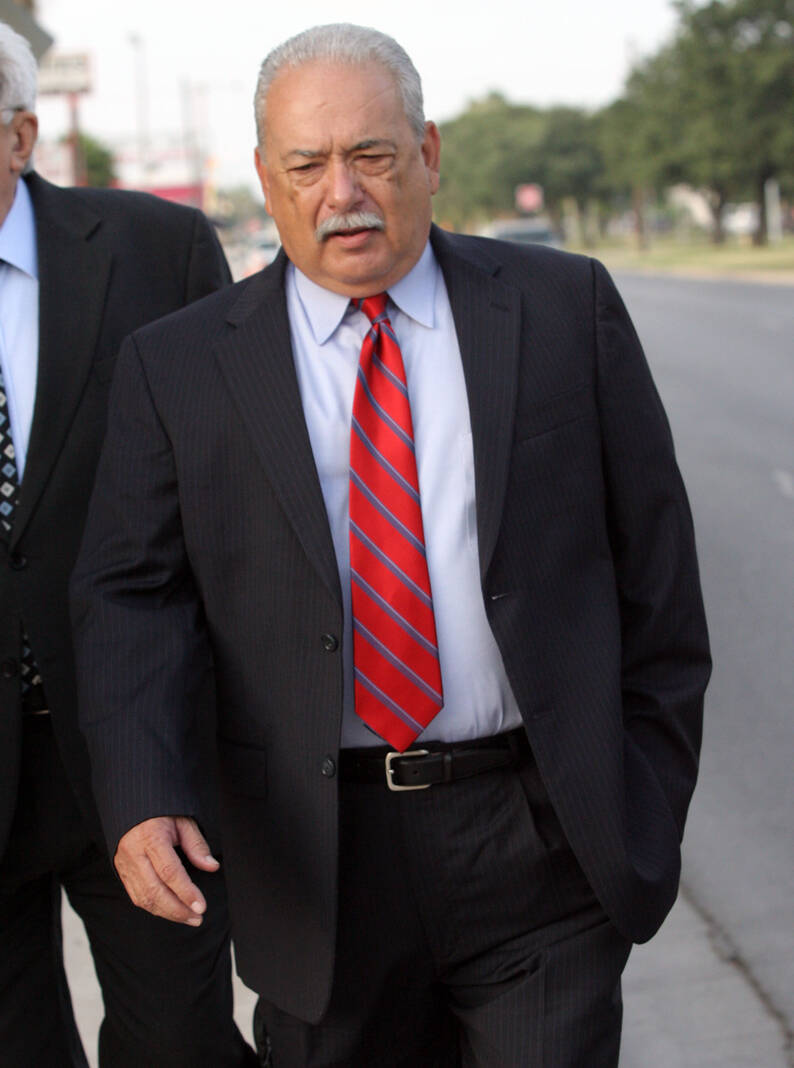
The man who once bribed former Hidalgo County Sheriff Guadalupe “Lupe” Treviño as part of a years long drug trafficking scheme that ensnared the sheriff and some of his top officers is asking a court to lift the remainder of his punishment.
Tomas Reyes Gonzalez, known as “El Gallo,” is asking U.S. District Judge Randy Crane to end the final portion of punishment imposed against him known as “supervised release.”
In November 2014, Gonzalez was sentenced to 10 years in federal prison after pleading guilty to conspiracy to distribute marijuana and conspiracy to commit money laundering.
He was released last March and has since been under court supervision as part of his sentence, which requires that he remain under supervision and make regular check-ins with the U.S. Probation Office for five years.
But on Tuesday, Gonzalez — who currently resides in Weslaco — filed a motion seeking the court’s permission to end that supervised release period early. Gonzalez filed the motion pro se¸ or on his own without an attorney.
The admitted drug trafficker cited “his extraordinary rehabilitation” and his compliance with the conditions of his release over the last year-and-a-half as reasons why the court should consider allowing his supervised release term to end.
Gonzalez also stated that his mandatory drug tests have all come back negative, he has met with his probation officer “without any issues,” and that he has “maintain(ed) gainful employment” since his release from prison.
The arrests and convictions of former Sheriff Treviño, his son and fellow law enforcement officer, Jonathan Treviño, as well as about a dozen others — mostly law enforcement — rocked the Rio Grande Valley in the early- to mid-2010s.
The younger Treviño, a Mission police detective who — along with a handful of sheriff’s deputies — was part of the Panama Unit drug interdiction team, was arrested in 2012 for using his position to rip off the very drug traffickers he was charged with investigating.
Two years later, Lupe Treviño was arrested on separate charges of engaging with known drug traffickers.
The fall of the sheriff and the Panama Unit — a crimefighting-turned-crime-committing task force — made national headlines that reinforced negative stereotypes about the Valley as a place rife with public corruption.
And one of the people at the center of the sheriff’s scandal was Gonzalez, who operated a massive drug trafficking organization out the Mid-Valley.
Gonzalez’s drug trafficking ring smuggled thousands of pounds of marijuana throughout the South, and as far as Iowa and North Carolina, according to court records.
A large reason Gonzalez was able to do so was because he had secured protection from various law enforcement officials, including one of Treviño’s top lieutenants, Jose A. Padilla.
Gonzalez paid a variety of bribes to members of the unit in exchange for things like calling off investigators who raided his Weslaco home before they could find the bulk of his stash, as well as increasing patrols near his properties in order to thwart other drug traffickers from stealing his illicit goods.
Gonzalez also gave substantial amounts of money to the former sheriff — either in person directly, or by using Padilla as an intermediary.
Both Gonzalez and Padilla claim Treviño accepted hundreds of thousands of dollars from the drug trafficker, though in court, the former sheriff maintained that figure was far lower — between $20,000-$25,000.
But the judge who ultimately sentenced Treviño wasn’t buying it.
“You said that you know what the truth is. Well, you may be the only one,” U.S. District Judge Micaela Alvarez said during Treviño’s 2014 sentencing hearing.
“You and Tomas Gonzalez, perhaps… and Jose Padilla, perhaps, may be the only ones that will ever know what the truth is,” Alvarez said, citing how Treviño’s admissions of guilt differed from his co-conspirators as described in a presentencing report prepared against him.
Though such reports are confidential, certain of its facts were revealed when Treviño appealed the five-year sentence handed down against him.
In a brief filed in support of upholding the sentence, federal prosecutors noted that they believed Treviño had accepted up to $335,000 in money he knew was drug proceeds — far more than the $25,000 he admitted to, and substantially more than the $10,000 he had tried to account for on his campaign finance reports.
However, the former sheriff argued that Alvarez had erred in handing down a lengthy sentence — one that was longer than recommended by both his defense attorneys and the government — after finding that Treviño had violated the public trust.
But for the judge, there was no divorcing Treviño’s position as sheriff — as “the top law enforcement in this county” — with the illicit drug proceeds disguised as contributions to his reelection campaign.
An appellate court denied Treviño’s appeal.
Treviño was released from a Pensacola, Florida prison in January 2019. His own supervised release term ended two years later, on Jan. 14, 2021.
Federal prosecutors have yet to file a response to Gonzalez’s motion to end his supervised release early.
Editor’s note: This article has been updated to reflect that the money laundering scheme that former Sheriff Lupe Treviño pleaded guilty to, and the drug trafficking scandal that led to the convictions of members of the Panama Unit drug task force, which included Treviño’s son, Jonathan Treviño, were two separate criminal cases.




